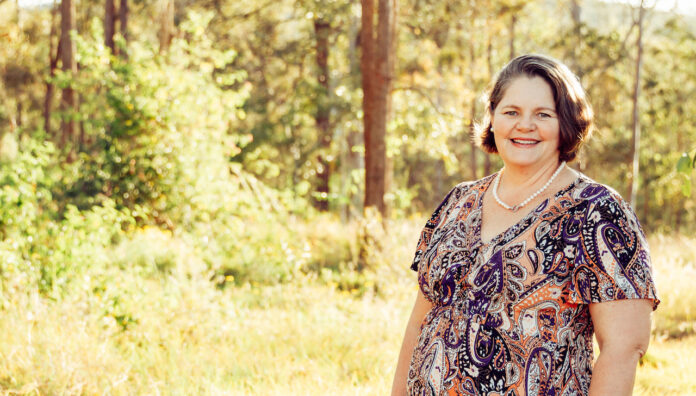From a stint in the Top End to owning a pharmacy in remote NSW, Anēwan and Wiradjuri woman Kellie Beckenham MPS is passionate about life outside the city, now near Casino, NSW.
Did you always want to be a pharmacist?
I initially wanted to join the air force, [but] I’ve always had an interest in science and excelled at science-based subjects. And my maternal grandmother had quite a lot of comorbidities. As a little girl I used to help dish out all of her pills in the morning.
I came from quite a low socioeconomic background; I was the first member of my family to finish high school. At the time, pharmacy was a rather lucrative industry to be in wage-wise. I also saw it as a really hands-on way to help people.
You moved from Tamworth, NSW to Tasmania for university. How was that?
I arrived not knowing a single soul. I was in my late 20s and had already done a science degree at the University of New England in Armidale, but that was basically just up the road. It was daunting moving so far from my family.
By the time I finished uni I was feeling a little braver. So I drove my bright yellow Mini from Hobart to Darwin, where I did my registration year at Darwin Private Hospital. I spent 6 months doing [dose administration aids] for remote communities, and the other half of the year on the wards. I got a taste of both worlds, and I was able to make a difference in other Indigenous people’s lives. It was a great period.
What did you learn as the owner of a rural pharmacy?
I was only qualified for 12 months when I went into pharmacy ownership in Mungindi, which is a tiny town of about 300 people on the Queensland-New South Wales border. I was there with my husband and children for 11 years.
The biggest highlight was that I got to interact with every patient, there was none of this hiding behind a counter business. But being a single practising pharmacist and mother of four working five-and-a-half days a week – that was tricky.
My husband was the primary carer for our children during this time. He also went from being a truck driver to a Certificate 2 pharmacy assistant. Mungindi has a very large Indigenous population, and I think it would have been hard for me to practise pharmacy well out there without him. It was easier for some of the patients to talk about men’s business with another man. I still provided the information, but it meant I could be slightly removed.
What do you find most satisfying as a pharmacist?
I love getting out from behind the counter. I’m a vaccinating pharmacist, so I like that I can provide that extra care within the pharmacy environment. And wounds are a bit of a passion of mine; I love seeing a terrible wound heal really nicely. I also completed my graduate certificate in diabetes management and education in 2019 and I’m almost fully credentialed as a diabetes educator. I had seen many of my patients with scripts for diabetes medicines and I wanted to be able to go the extra mile for them.
How has being a First Nations woman impacted your career?
People are often surprised to find out that I’m Aboriginal, so my experience might be different to others. But I do see a gap – we focus so much on western medicine. I would be interested to see how we can use some of the remedies that have been passed down through generations.
Just the other day an Indigenous lady came into the pharmacy and said, ‘I tell people all the time to come and see you if they want to talk about women’s stuff. You’re a Koori woman and you understand.’
When I started my degree in 2000, cultural appropriateness wasn’t really discussed or taught, but it’s so important.
What advice would you give to ECPs?
Check out any opportunity that comes your way. And don’t be afraid to leave the city. Get out there, see this country we’ve got, put your patients in the middle of everything you do and you’ll reap the rewards.



 John Jones MPS, pharmacist immuniser and owner of My Community Pharmacy Shortland in Newcastle, NSW[/caption]
John Jones MPS, pharmacist immuniser and owner of My Community Pharmacy Shortland in Newcastle, NSW[/caption]


 Debbie Rigby FPS explaining how to correctly use different inhaler devices[/caption]
Debbie Rigby FPS explaining how to correctly use different inhaler devices[/caption]




 Professor Sepehr Shakib[/caption]
Professor Sepehr Shakib[/caption]

 Lee McLennan MPS[/caption]
Lee McLennan MPS[/caption]
 Dr Natalie Soulsby FPS, Adv Prac Pharm[/caption]
Dr Natalie Soulsby FPS, Adv Prac Pharm[/caption]
 Joanne Gross MPS[/caption]
Joanne Gross MPS[/caption]








